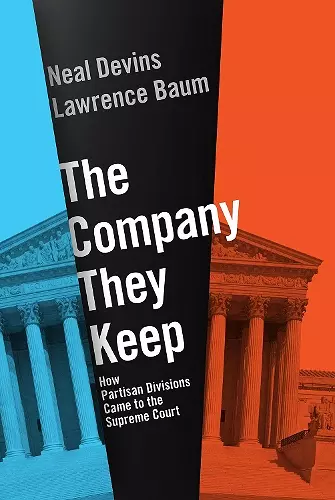The Company They Keep
How Partisan Divisions Came to the Supreme Court
Lawrence Baum author Neal Devins author
Format:Paperback
Publisher:Oxford University Press Inc
Published:22nd Sep '20
Currently unavailable, and unfortunately no date known when it will be back
This paperback is available in another edition too:
- Hardback£26.99(9780190278052)

Are Supreme Court justices swayed by the political environment that surrounds them? Most people think "yes," and they point to the influence of the general public and the other branches of government on the Court. It is not that simple, however. As the eminent law and politics scholars Neal Devins and Lawrence Baum show in The Company They Keep, justices today are reacting far more to subtle social forces in their own elite legal world than to pressure from the other branches of government or mass public opinion. In particular, the authors draw from social psychology research to show why Justices are apt to follow the lead of the elite social networks that they are a part of. The evidence is strong: Justices take cues primarily from the people who are closest to them and whose approval they care most about: political, social, and professional elites. In an era of strong partisan polarization, elite social networks are largely bifurcated by partisan and ideological loyalties, and the Justices reflect that division. The result is a Court in which the Justices' ideological stances reflect the dominant views in the appointing president's party. Justices such as Clarence Thomas and Ruth Bader Ginsburg live largely in a milieu populated by like-minded elites. Today's partisanship on the Court also stems from the emergence of conservative legal networks such as the Federalist Society, that reinforce the conservative leanings of Republican appointees. For the Warren and Burger Courts, elite social networks were dominated by liberal elites and not divided by political party or ideology. A fascinating examination of the factors that shape decision-making, The Company They Keep will reshape our understanding of how political polarization occurs on the contemporary Supreme Court.
Preserving [the Supreme Court's] independence has grown far more difficult for reasons ably explored in Neal Devins and Lawrence Baums' The Company They Keep, a carefully argued and disturbing portrait of how partisan politics threaten to engulf the Court. * New York Review of Books *
Drawing on the methodologies of social psychology and political science, Professors Neal Devins and Lawrence Baum argue that the ideological stances of Supreme Court Justices are informed by a more subtle force than party loyalty or changing public norms... Rather than framing the judiciary as politicians in robes, Devins and Baum's analysis seeks to expose the Justices of the Supreme Court as something perhaps more sinister - that is, as humans seeking validation. * Harvard Law Review *
This fascinating book draws not only on political science and legal scholarship but on social psychology to bring us important new insights into the behavior of the Supreme Court justices whose decisions shape our constitutional order."-Linda Greenhouse, Lecturer, Yale Law School
The Company They Keep is essential reading for anyone who wants to understand today's Supreme Court. Drawing upon a wide range of material from political science and American history, Neal Devins and Lawrence Baum carefully explain how partisan polarization has come to the Supreme Court. Their discussions of networks of legal elites and of the Republican Party's somewhat more effective use of those networks are particularly illuminating."-Mark Tushnet, William Nelson Cromwell Professor of Law at Harvard Law School
In a fascinating new book titled The Company They Keep to be published early next year, two prominent students of judicial behavior, Neal Devins and Lawrence Baum, explore the Supreme Court's current polarization through the lens of social psychology...It's a fresh observation of an old phenomenon." - Linda Greenhouse, The New York Times
The Company They Keep breaks from the literature on Supreme Court decision-making by describing judicial partisanship as a social phenomenon * a consequence, in part, of justices wanting approval from their elite peers. Devins, a law professor at William & Mary, and Baum, a political scientist at Ohio State, develop their argument by importing insights from social psychology. Devins and Baum put Supreme Court watchers on the right track by focusing on the justices not simply as individuals, but as members of teams that play in partisan political leagues... The Company They Keep reminds us that today's Supreme Court justices, far from calling balls and strikes, are very much in the game. And they're playing to win." -Mark A. Graber, Washington Monthly *
In the Company They Keep, Neal Devins and Lawrence Baum write an compelling, elegant, and permanent addition to the political science on the Court. In their view, the Court is substantially more influenced by elite than by popular opinion. The great strength of their book flows from arguments supported both by theory and empirics." - John McGinnis, Balkinization
[The Company They Keep is] a book we're reading. It examines the elite social and political environment that surrounds justices and makes the powerful point that the growth of the Federalist Society has created a welcoming, reaffirming environment that helps conservative justices from drifting to the left and that contributed to the polarization of the court." - Marcia Coyle and Tony Mauro, National Law Journal
ISBN: 9780197539156
Dimensions: 160mm x 236mm x 23mm
Weight: 454g
272 pages